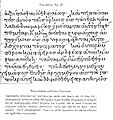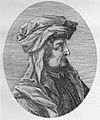Historian facts for kids
A historian is like a detective of the past! They are people who study history, which is everything that happened before today. Historians try to understand how things changed over time and why certain events took place. They help us learn about people, places, and ideas from long ago.
Contents
What Does a Historian Do?
Historians spend a lot of time researching. They look for clues about the past in many different places. Their main goal is to understand what happened, when it happened, and why.
Finding Clues from the Past
Historians use many kinds of sources to learn about history. These sources are like clues that help them piece together the story.
- Written sources: These include old letters, diaries, government records, newspapers, books, and maps. They can tell us what people thought and did.
- Oral sources: Sometimes, historians talk to people who remember past events. This is called oral history. It's a great way to learn about recent history from those who lived through it.
- Visual sources: Pictures, paintings, photographs, and videos can show us what things looked like in the past.
- Artifacts: These are objects that people made or used, like tools, pottery, clothes, or buildings. Archaeologists often find these, and historians use them to understand daily life.
Putting the Pieces Together
After gathering clues, historians analyze them carefully. They ask questions like:
- Is this source reliable?
- Who created it and why?
- Does it match other sources?
Historians compare different sources to get a full picture. They try to understand different viewpoints and avoid bias. Then, they write books, articles, or create documentaries to share what they have learned with others.
Why Study History?
Studying history is very important for many reasons. It helps us understand ourselves and the world around us.
Learning from the Past
History teaches us about the successes and mistakes of people before us. By looking at past challenges, we can learn how to solve problems today. For example, studying how societies dealt with diseases in the past can help us prepare for future health challenges.
Understanding Our World Today
Many things in our world, like our governments, cultures, and technologies, have developed over a long time. History explains how they got to be the way they are. It helps us understand why different countries or groups of people have certain traditions or beliefs.
Developing Important Skills
Studying history helps you develop useful skills:
- Critical thinking: You learn to question information and look for evidence.
- Research skills: You learn how to find and use information effectively.
- Writing skills: You learn to explain complex ideas clearly.
- Empathy: You learn to understand different perspectives and experiences.
Different Kinds of Historians
Historians can specialize in many different areas. Some focus on a specific time period, while others study a particular topic or region.
By Time Period
- Ancient Historians: They study very old times, like the ancient Egyptians, Greeks, or Romans.
- Medieval Historians: They focus on the Middle Ages, from about 500 AD to 1500 AD.
- Modern Historians: They study more recent times, from the 1500s to today.
By Topic
- Political Historians: They study governments, leaders, and how countries are run.
- Social Historians: They look at the daily lives of ordinary people, families, and communities.
- Cultural Historians: They explore art, music, ideas, and beliefs of different societies.
- Economic Historians: They study how people made a living, traded goods, and managed money.
Famous Historians
Throughout history, many people have dedicated their lives to studying and writing about the past.
- Herodotus (around 484–425 BC) is often called the "Father of History." He was an ancient Greek writer who traveled widely and wrote about the wars between the Greeks and Persians.
- Thucydides (around 460–400 BC) was another Greek historian who wrote about the Peloponnesian War. He tried to be very objective and look at causes and effects.
- Bede (around 672–735 AD) was an English monk who wrote an important history of the English church and people.
- Leonardo Bruni (around 1370–1444) was an Italian historian who was one of the first to divide history into three main periods: Ancient, Middle Ages, and Modern.
- Voltaire (1694–1778) was a French writer and philosopher who wrote many historical works during the Age of Enlightenment.
- Edward Gibbon (1737–1794) wrote a famous book called The History of the Decline and Fall of the Roman Empire, which is still read today.
- Leopold von Ranke (1795–1886) was a German historian who helped make history a professional academic subject, focusing on using original sources.
- Marc Bloch (1886–1944) was a French historian who focused on social history, looking at how everyday people lived.
Historians continue to discover new things about the past and help us understand our world better.
Related pages
Images for kids
-
Herodotus (c. 484–c. 425 BC) was a Greek historian who lived in the fifth century BC and one of the earliest historians whose work survives.
-
Reproduction of part of a tenth-century copy of Thucydides's History of the Peloponnesian War.
-
Leonardo Bruni (c.1370–1444), the historian who first divided history into the three eras of Antiquity, the Middle Ages, and Modern times.
-
A page of Bede's Ecclesiastical History of the English People
-
Voltaire's works of history are an excellent example of Enlightenment era history writing. Painting by Pierre Charles Baquoy.
-
Edward Gibbon's Decline of the Roman Empire (1776) was a masterpiece of late 18th-century history writing.
-
Ranke established history as a professional academic discipline in Germany.
-
The 20th century saw the creation of a huge variety of historiographical approaches. Marc Bloch's focus on social history rather than traditional political history was of tremendous influence.
-
Peter R.L Brown, a Princeton historian of Late Antiquity and the Medieval period.
See also
 In Spanish: Historiador para niños
In Spanish: Historiador para niños











